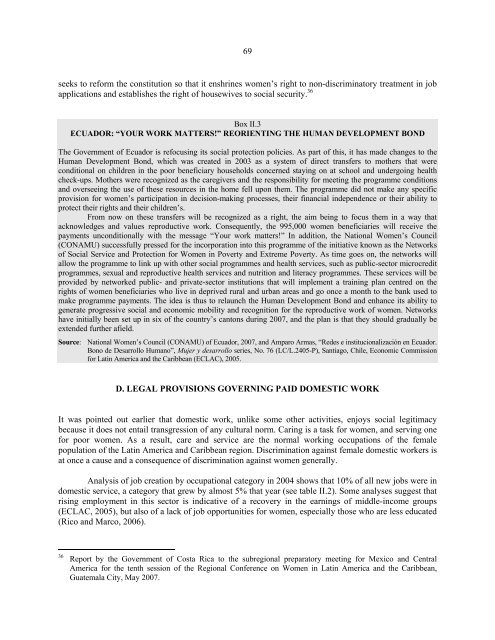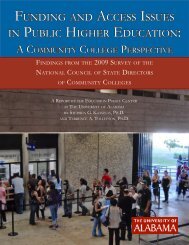Women in Latin America and the Caribbean - Cepal
Women in Latin America and the Caribbean - Cepal
Women in Latin America and the Caribbean - Cepal
Create successful ePaper yourself
Turn your PDF publications into a flip-book with our unique Google optimized e-Paper software.
69<br />
seeks to reform <strong>the</strong> constitution so that it enshr<strong>in</strong>es women’s right to non-discrim<strong>in</strong>atory treatment <strong>in</strong> job<br />
applications <strong>and</strong> establishes <strong>the</strong> right of housewives to social security. 36<br />
Box II.3<br />
ECUADOR: “YOUR WORK MATTERS!” REORIENTING THE HUMAN DEVELOPMENT BOND<br />
The Government of Ecuador is refocus<strong>in</strong>g its social protection policies. As part of this, it has made changes to <strong>the</strong><br />
Human Development Bond, which was created <strong>in</strong> 2003 as a system of direct transfers to mo<strong>the</strong>rs that were<br />
conditional on children <strong>in</strong> <strong>the</strong> poor beneficiary households concerned stay<strong>in</strong>g on at school <strong>and</strong> undergo<strong>in</strong>g health<br />
check-ups. Mo<strong>the</strong>rs were recognized as <strong>the</strong> caregivers <strong>and</strong> <strong>the</strong> responsibility for meet<strong>in</strong>g <strong>the</strong> programme conditions<br />
<strong>and</strong> oversee<strong>in</strong>g <strong>the</strong> use of <strong>the</strong>se resources <strong>in</strong> <strong>the</strong> home fell upon <strong>the</strong>m. The programme did not make any specific<br />
provision for women’s participation <strong>in</strong> decision-mak<strong>in</strong>g processes, <strong>the</strong>ir f<strong>in</strong>ancial <strong>in</strong>dependence or <strong>the</strong>ir ability to<br />
protect <strong>the</strong>ir rights <strong>and</strong> <strong>the</strong>ir children’s.<br />
From now on <strong>the</strong>se transfers will be recognized as a right, <strong>the</strong> aim be<strong>in</strong>g to focus <strong>the</strong>m <strong>in</strong> a way that<br />
acknowledges <strong>and</strong> values reproductive work. Consequently, <strong>the</strong> 995,000 women beneficiaries will receive <strong>the</strong><br />
payments unconditionally with <strong>the</strong> message “Your work matters!” In addition, <strong>the</strong> National <strong>Women</strong>’s Council<br />
(CONAMU) successfully pressed for <strong>the</strong> <strong>in</strong>corporation <strong>in</strong>to this programme of <strong>the</strong> <strong>in</strong>itiative known as <strong>the</strong> Networks<br />
of Social Service <strong>and</strong> Protection for <strong>Women</strong> <strong>in</strong> Poverty <strong>and</strong> Extreme Poverty. As time goes on, <strong>the</strong> networks will<br />
allow <strong>the</strong> programme to l<strong>in</strong>k up with o<strong>the</strong>r social programmes <strong>and</strong> health services, such as public-sector microcredit<br />
programmes, sexual <strong>and</strong> reproductive health services <strong>and</strong> nutrition <strong>and</strong> literacy programmes. These services will be<br />
provided by networked public- <strong>and</strong> private-sector <strong>in</strong>stitutions that will implement a tra<strong>in</strong><strong>in</strong>g plan centred on <strong>the</strong><br />
rights of women beneficiaries who live <strong>in</strong> deprived rural <strong>and</strong> urban areas <strong>and</strong> go once a month to <strong>the</strong> bank used to<br />
make programme payments. The idea is thus to relaunch <strong>the</strong> Human Development Bond <strong>and</strong> enhance its ability to<br />
generate progressive social <strong>and</strong> economic mobility <strong>and</strong> recognition for <strong>the</strong> reproductive work of women. Networks<br />
have <strong>in</strong>itially been set up <strong>in</strong> six of <strong>the</strong> country’s cantons dur<strong>in</strong>g 2007, <strong>and</strong> <strong>the</strong> plan is that <strong>the</strong>y should gradually be<br />
extended fur<strong>the</strong>r afield.<br />
Source: National <strong>Women</strong>’s Council (CONAMU) of Ecuador, 2007, <strong>and</strong> Amparo Armas, “Redes e <strong>in</strong>stitucionalización en Ecuador.<br />
Bono de Desarrollo Humano”, Mujer y desarrollo series, No. 76 (LC/L.2405-P), Santiago, Chile, Economic Commission<br />
for Lat<strong>in</strong> <strong>America</strong> <strong>and</strong> <strong>the</strong> <strong>Caribbean</strong> (ECLAC), 2005.<br />
D. LEGAL PROVISIONS GOVERNING PAID DOMESTIC WORK<br />
It was po<strong>in</strong>ted out earlier that domestic work, unlike some o<strong>the</strong>r activities, enjoys social legitimacy<br />
because it does not entail transgression of any cultural norm. Car<strong>in</strong>g is a task for women, <strong>and</strong> serv<strong>in</strong>g one<br />
for poor women. As a result, care <strong>and</strong> service are <strong>the</strong> normal work<strong>in</strong>g occupations of <strong>the</strong> female<br />
population of <strong>the</strong> Lat<strong>in</strong> <strong>America</strong> <strong>and</strong> <strong>Caribbean</strong> region. Discrim<strong>in</strong>ation aga<strong>in</strong>st female domestic workers is<br />
at once a cause <strong>and</strong> a consequence of discrim<strong>in</strong>ation aga<strong>in</strong>st women generally.<br />
Analysis of job creation by occupational category <strong>in</strong> 2004 shows that 10% of all new jobs were <strong>in</strong><br />
domestic service, a category that grew by almost 5% that year (see table II.2). Some analyses suggest that<br />
ris<strong>in</strong>g employment <strong>in</strong> this sector is <strong>in</strong>dicative of a recovery <strong>in</strong> <strong>the</strong> earn<strong>in</strong>gs of middle-<strong>in</strong>come groups<br />
(ECLAC, 2005), but also of a lack of job opportunities for women, especially those who are less educated<br />
(Rico <strong>and</strong> Marco, 2006).<br />
36<br />
Report by <strong>the</strong> Government of Costa Rica to <strong>the</strong> subregional preparatory meet<strong>in</strong>g for Mexico <strong>and</strong> Central<br />
<strong>America</strong> for <strong>the</strong> tenth session of <strong>the</strong> Regional Conference on <strong>Women</strong> <strong>in</strong> Lat<strong>in</strong> <strong>America</strong> <strong>and</strong> <strong>the</strong> <strong>Caribbean</strong>,<br />
Guatemala City, May 2007.











